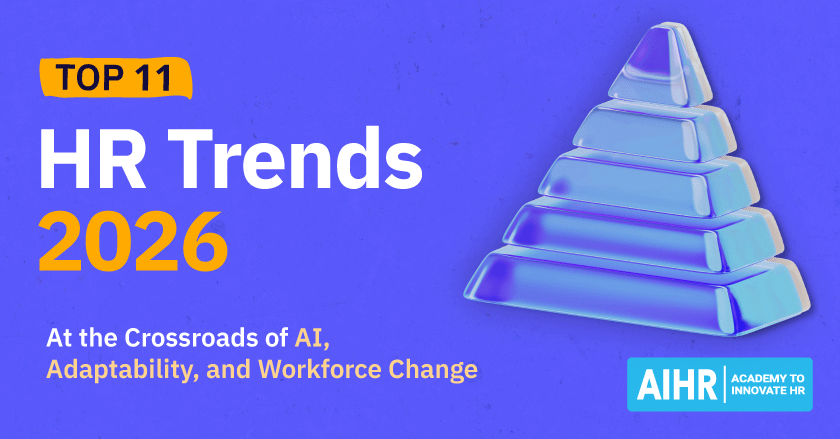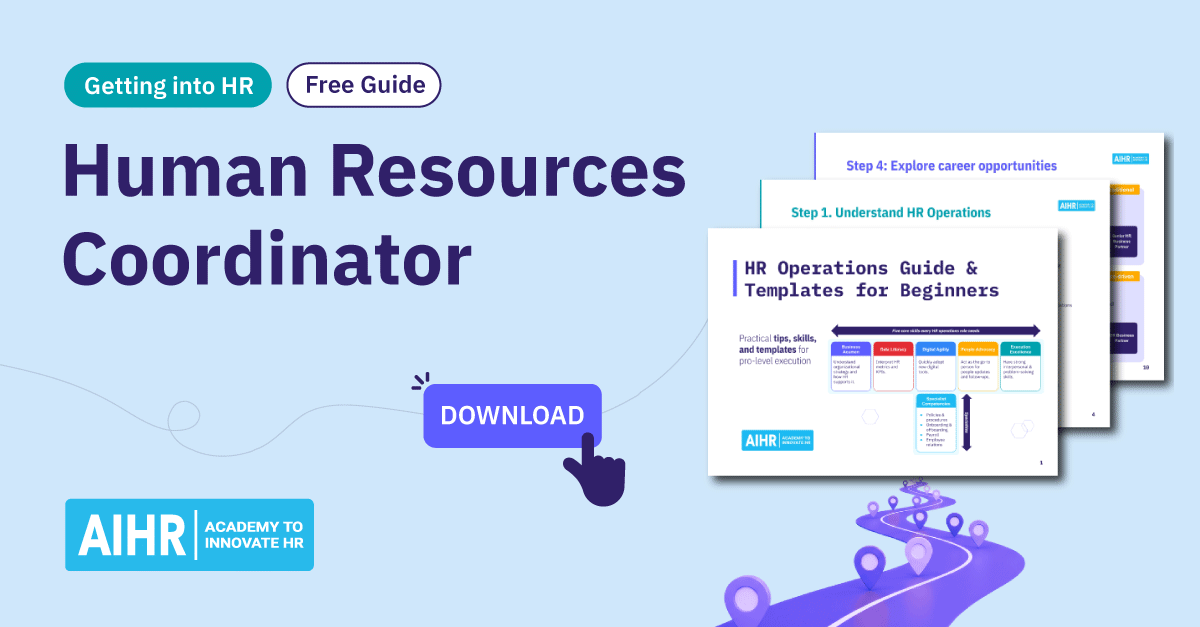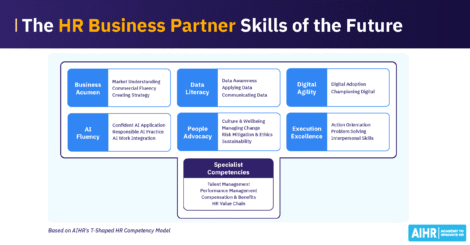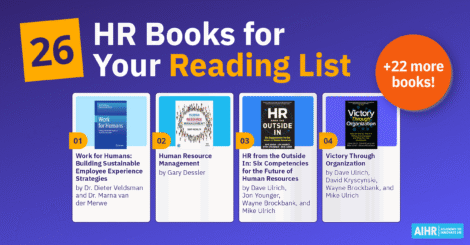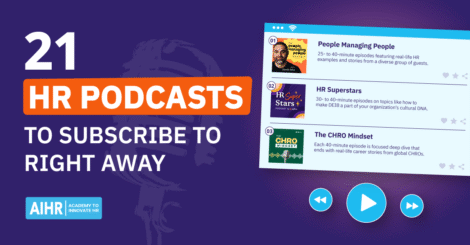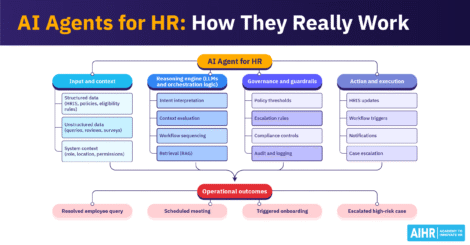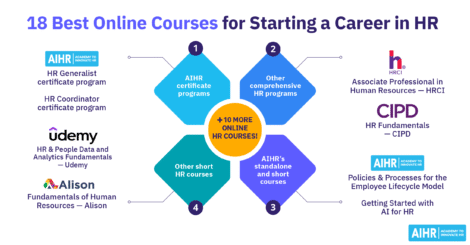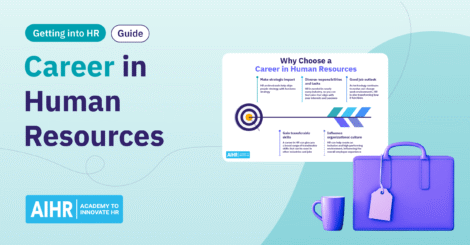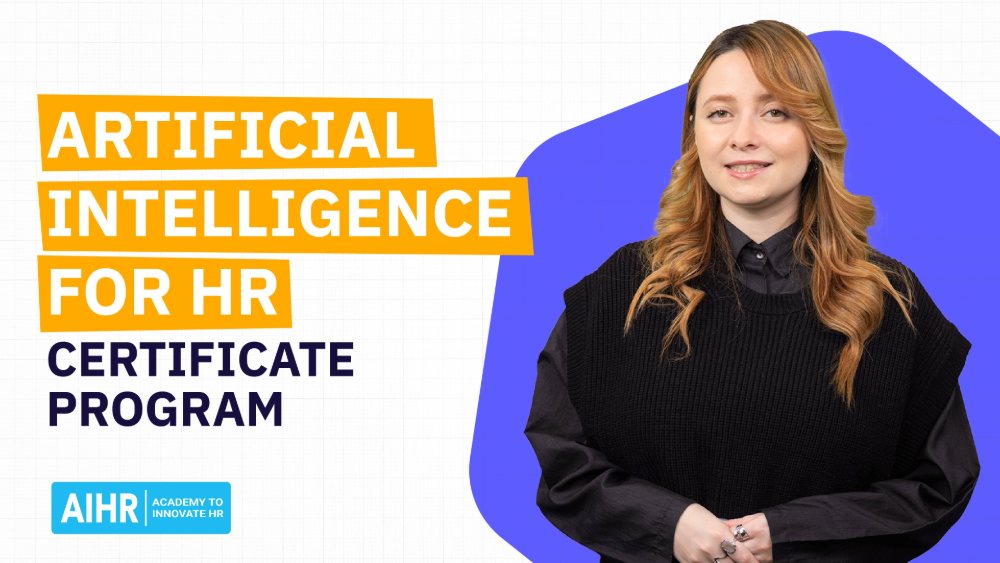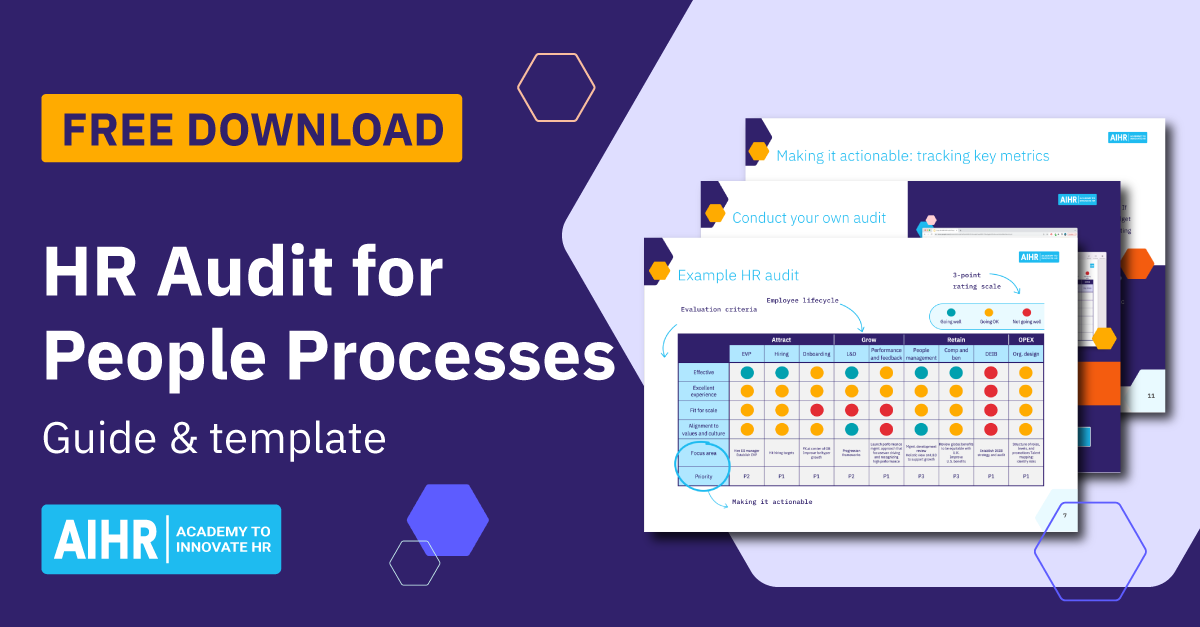If you’re interested in coordinating an HR department’s activities and keeping its processes running smoothly, becoming a Human Resources Coordinator could be a great fit. Professionals in this role support the HR department’s daily operations and handle questions or concerns from both new hires and current employees.
This article explains what an HR coordinator does, the skills and qualifications you need, salary expectations, and which AIHR programs can help you prepare for the role. Let’s go!
If you’re looking to grow in this area or want to better understand how to excel in HR operations roles like this one, download our Ultimate Guide to Mastering HR Operations. It includes a 4-step roadmap, practical templates, and career development tips to help you build the skills you need to succeed in your HR operations career.
Contents
What is a Human Resources Coordinator?
Human Resources Coordinator job description
Qualifications for a Human Resources Coordinator role
Skills and competencies for a Human Resources Coordinator role
Average Human Resources Coordinator salary
AIHR certificate programs to take
Career path for a Human Resources Coordinator
FAQ
What is a Human Resources Coordinator?
A Human Resources (HR) Coordinator helps manage and support all major HR functions, programs, and initiatives. They handle employee and new hire questions about employment, compensation and benefits, labor negotiations, employee relations, and more.
The HR Coordinator role is typically an entry-level position that reports to the HR Director. The focus is on improving HR policies and processes while recommending enhancements to HR management.
Human Resources Coordinator job description
A Human Resources Coordinator job description can look different from one organization to another.
In larger companies, there may even be several HR Coordinators, each focusing on different areas to maximize efficiency and productivity. For example, you might find coordinators specializing in recruiting, learning and development (L&D), employee benefits, and more.
This article takes a generalist perspective on the role. However, a Human Resources Coordinator’s specific responsibilities will vary depending on the organization. Below are some of the most common tasks associated with this position.
Recruitment and onboarding
When it comes to hiring and welcoming new employees, a Human Resources Coordinator typically:
- Helps identify, interview, and select candidates
- Manages administrative tasks related to the new hire process, such as preparing contracts and updating HR systems
- Supports preboarding and onboarding by staying in touch with new employees, answering questions, and sharing relevant materials.
Administrative tasks
A large part of the role involves administrative support, including:
- General HR administration and coordination
- Responding to internal and external HR-related questions
- Assisting with payroll tasks
- Maintaining and updating employee records in the HRIS
- Coordinating termination procedures
- Scheduling meetings, interviews, and HR events.
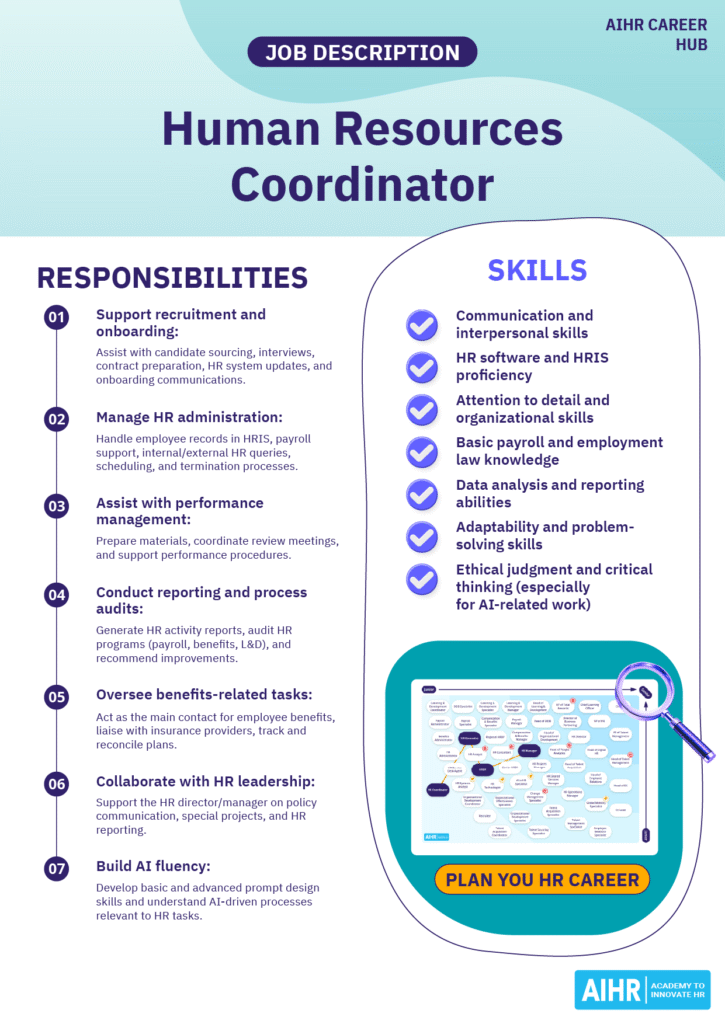
Performance management
Human Resources Coordinators also assist with performance management by:
- Preparing materials for performance reviews
- Supporting performance management procedures
- Organizing and coordinating review meetings.
Reporting and process improvements
As mentioned earlier, a significant part of the HR coordinator’s job is trying to improve existing processes. This involves doing a lot of research, data analysis, and reporting. Tasks that come with this part of the job include:
- Conducting audits of HR programs such as payroll, benefits, L&D, and retirement
- Generating reports on overall HR activity
- Recommending improvements based on research and analysis.
Employee benefits
Benefits-related duties often fall within the coordinator’s scope as well. These can include:
- Being the go-to person for employees with questions or issues related to their benefits
- Acting as the liaison between employees and insurance providers
- Administering health and welfare plans
- Tracking benefit programs such as healthcare and retirement
- Reconciling benefits statements.
Working with the HR Director
Human Resources Coordinators report to and collaborate closely with the HR Director or Manager. Their work may involve:
- Supporting the HR director in educating employees and enforcing company policies.
- Supporting the HR director with any special (ad hoc) projects they need assistance with.
- Reporting to the HR director about all HR endeavors.
Qualifications for a Human Resources Coordinator role
While the exact requirements vary by organization, employers often look for the following qualifications:
- A bachelor’s degree in Human Resources, Business Administration, Finance, Business Management, or a related field
- A master’s degree in Human Resources Management or Business Administration is preferred, but not always required
- One to two years of HR, administrative, or similar work experience
- HR-specific certifications, such as those offered by the Human Resource Certification Institute (HRCI), the Society for Human Resource Management (SHRM), or the Academy to Innovate HR (AIHR), which are not required but highly valued
- Experience using HR software and HRIS databases (including payroll systems) is a plus.
Build HR coordination skills that set the foundation for your career
Strong HR coordination is about more than handling admin. It’s about being the reliable engine behind smooth operations, compliance, and a positive employee experience.
With the HR Coordinator Certification, you’ll:
✅ Master the day-to-day tools, tasks, and systems of HR coordination
✅ Build confidence in managing employee records, payroll, and benefits
✅ Develop communication and process improvement skills that boost your visibility
✅ Learn how to support strategic HR initiatives in a growing organization
🎓 Get equipped with the skills and structure to thrive in your first HR role and grow from there.
Skills and competencies for a Human Resources Coordinator role
To thrive as a Human Resources Coordinator, you’ll need both technical and interpersonal skills.
Technical (hard) skills
- HR software proficiency: Familiarity with HRIS, payroll systems, and other HR tools used by the organization.
- Employee records management: Accurate maintenance of personnel files and adherence to confidentiality protocols.
- Payroll processing basics: Timekeeping, data entry, and ensuring compliance with local pay regulations.
- Basic labor and employment law knowledge: Understanding of regulations such as EEO, FMLA, FLSA, and GDPR, depending on the company’s location
- Data and reporting: Ability to analyze data, prepare basic reports, and make informed recommendations.
Soft skills
- Strong communication and presentation: Convey information clearly and effectively in both written and verbal forms to diverse audiences.
- Attention to detail: High accuracy is essential for tasks such as updating payroll systems and maintaining employee records.
- Interpersonal skills: Ability to build relationships and address issues with employees from various backgrounds
- Adaptability: Comfort with handling a wide variety of tasks and shifting priorities.
- Problem-solving: Ability to troubleshoot and find solutions for employee concerns and HR process challenges.
AI in HR
The growing use of AI and automation in HR is changing the skills HR Coordinators need, both now and in the near future.
AI-related soft skills
- Critical thinking: Interpreting AI-generated results effectively.
- Ethical judgment: Ensuring fairness and minimizing bias in AI-driven processes.
- Communication: Explaining AI-driven decisions to employees and stakeholders clearly
- Problem-solving: Addressing employee concerns that arise from AI implementations.
AI-related technical skills
- Basic prompt design: Crafting clear and effective prompts for generative AI tools like AIHR Copilot, ChatGPT, or Mistral.
- Advanced prompt design (promot chaining): Developing more complex prompts to handle nuanced or multi-step HR tasks.
As organizations increasingly adopt generative AI for tasks traditionally handled by HR coordinators, developing AI fluency is becoming a critical skill. To boost your readiness, there are various AI training options out there. We will list a couple of them in one of the sections below.
HR career tip
Reach out to someone who is currently working as a Human Resources Coordinator, for example, via LinkedIn. Let them know you are exploring this career path and ask if they would be open to a short virtual coffee chat where they can share insights about their day-to-day responsibilities and career journey.
Average Human Resources Coordinator salary
If you are considering a career in HR or thinking about switching industries, one of the first questions you might have is: How much does a Human Resources Coordinator make?
According to Revellio Lab’s current data, the salary for a Human Resources Coordinator in the U.S. typically ranges from $48,000-$60,000.
Keep in mind that salaries vary based on factors such as experience, company size, industry, geographic location, and position level. In addition to salary, many companies also offer additional compensation like bonuses, stock options, training budgets, and other employee benefits.
AIHR certificate programs to take
Ready to start your journey toward becoming a Human Resources Coordinator? The following AIHR certificate programs are designed to help you succeed:
- HR Coordinator Certificate Program: This program teaches you the HR fundamentals and how to master them across the employee life cycle. Gain skills to create, implement, and maintain HR policies that support business goals, develop HR project management abilities, and build strong communication skills to represent HR effectively.
- Artificial Intelligence for HR Certificate Program: Enroll in this program to learn how to leverage AI confidently in HR, apply AI solutions to be more effective and productive, and equip yourself with future-ready AI skills.
- HR Metrics & Dashboarding Certificate Program: In this program, you will learn how to communicate data effectively with compelling reports and storytelling techniques, and develop the skills to analyze HR data and cover the entire reporting process.
- Gen AI Prompt Design for HR: Mini Course: This mini course will teach you how to master Gen AI prompt techniques and apply them immediately. You will also learn about best practices for using Gen AI safely and securely, and how to enhance the quality of your prompts with prompt chaining.
HR career tip
There’s more than one way to build a career in HR. Explore our list of 9 top HR coordinator courses designed to help you develop the skills needed to succeed as an effective Human Resources Coordinator.
Career path for a Human Resources Coordinator
An HR Coordinator role can lead to different opportunities depending on your skills, competencies, interests, and the size or type of organization you work for. A typical career path might look like this:
Common progression
- Entry-level: HR coordinator
- Mid-level: HR Generalist
- Advanced: HR Specialist or HR Business Partner
- Senior: HR Manager
Lateral opportunities
- Recruiter
- Benefits Coordinator
- L&D Coordinator
- HR Systems Analyst.
To explore your ideal HR career path, learn which skills to master, understand salary expectations, and more, check out our HR Career Map tool.
Next steps
The Human Resources Coordinator role is an excellent starting point for a career in HR. To begin your journey, reflect on your current strengths and identify areas for growth. From there, choose a relevant training program such as AIHR’s HR Coordinator Certificate Program.
In addition, if you haven’t done so yet, join an online HR community to connect with peers and expand your network. If you know someone already working in HR, reach out to them for insights and advice about their experience.
FAQ
A Human Resources Coordinator helps manage key HR functions such as recruitment, onboarding, benefits administration, and maintaining employee records. They ensure daily HR operations run smoothly and employees have the support they need.
Most roles require a bachelor’s degree in Human Resources, Business Administration, or a related field, along with one to two years of HR or administrative experience. HR certifications (e.g., SHRM, HRCI, AIHR) and familiarity with HR software can also give you an advantage.
As of August 2025, the average salary in the U.S. is about $54,429 per year. Pay typically ranges between $43,000 and $65,000 depending on experience, company size, industry, and location.


